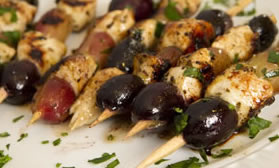The Weight Battle
Dietitians offer strategies for controlling weight after cancer treatment

Michelle Churches walks 11,000 steps during her 10-hour nursing shift at an outpatient surgery center in Trenton.
She knows this because she wears a pedometer. After walking those 11,000 steps, she comes home and pulls together a homemade dinner in about 30 minutes. She chats with her husband and kids, cleans up the kitchen and heads out to walk the dog. Some weeks, depending on her work schedule, she'll fit in an extra 12-hour shift to help fund a gift she wants to give her three children: a debtfree ride through college.
To say that Churches is active would draw an affectionate chuckle from her friends. When the season is right, Churches has been known to work from dawn to dusk in her herb garden, stopping only long enough for occasional water breaks. So when she was diagnosed in 2005 with breast cancer, weight wasn't a concern for her. She was 5 feet 7 inches and 138 pounds. But after a mastectomy, chemotherapy, radiation and hormone therapy, Churches has found it's more difficult to maintain her weight.
"I work my butt off so that now when I look at a Reese's Peanut Butter Cup, I have a little calculator in my head: How much will it take to burn this off? Is it worth it?" she says.
At the University of Michigan Rogel Cancer Center, dietitians Joan Daniels and Nancy Burke spend a lot of time helping people prevent weight loss during treatment. But they also see patients who struggle to lose weight after cancer treatment. This is particularly true of breast and prostate cancer patients who receive hormone therapy. Certain chemotherapy regimens also may cause patients to lose muscle and gain fat tissue.
It may be more difficult to lose weight, but Daniels and Burke stress that it's still important to try to control what you can: diet and exercise.
Weight-Loss Tips
- Keep a food log. You may be eating more than you think.
- Pay attention to what you drink. Sodas and sugary coffee drinks often contain a lot of calories.
- Cut back on butter and oil. Use herbs to flavor foods instead.
- Make meat secondary. Fill your plate with vegetables, fruits and whole grains. Think of lean meats and low-fat dairy products as side dishes.
- Consider strength-building exercises if you have lost muscle or gained fat tissue.
"The bottom line is that you can manage your weight, but it takes a lot more effort," Daniels said. "You have to exercise more and you have to cut back your food more."
Depression may also be an underlying factor that needs to be addressed, Daniels said. Sometimes the full psychological impact of cancer doesn't hit until a patient is into post-treatment survivorship. This can interfere with exercise regimens or cause people to binge.
Exercise can help reduce depression and anxiety as well as lower the risk of recurrence. One strategy Burke recommends for patients seeking to lose weight is to find an activity they enjoy to boost their commitment to exercising. For Churches, gardening is a great workout and also keeps her kitchen stocked during part of the year with healthy fruits, vegetables and herbs. Late last fall, as the season was ending, Churches was preparing to dry herbs to season foods during the winter months.
Churches uses herbs as a way to boost flavors without adding fat. Staying organized also makes eating healthier easier: Churches stocks the pantry with good choices so healthy snacks are always within reach. S he prepares meals ahead of time so that there's very little work to do to get the meal on the table after work. The Churcheses limit take-out to Wednesday nights when they splurge on a pizza or Mexican food.
"All the women in my family cook like this. My mom always said, 'Fast food is nothing but poison,'" Churches said, pausing to admit her guilty pleasure: Diet Coke. "My mom always had stuff she could throw together simply, and I do, too. I practice what I preach."
Michelle Churches's Chenin Blanc Chicken

Marinade:
- 1/4 c. olive oil
- 1/4c. Chenin Blanc white wine
- zest of one lemon
- juice from ½ lemon
- 2 cloves of pressed garlic
- 1/2 tsp. dried oregano
- 1/2 tsp. sea salt
- pinch of pepper
1 to 2 lbs chicken, cubed
red or black seedless grapes
Minced flat-leaf parsley
Skewers, soaked in water 30 minutes
In a non-reactive bowl, whisk together the marinade ingredients until well emulsified. Toss the chicken with the marinade and refrigerate overnight.
Skewer chicken, alternating with grapes. Heat grill or grill pan over medium heat. Cook skewers until chicken juices run clear, about 3 minutes on each side. Grapes should puff and caramelize.
Sprinkle with parsley and serve.
Get more weight-loss tips and healthy eating ideas:
- Comfort Foods
- Fads Fade Fast, But Healthy Eating Sticks
- Bounty of the Mediterranean
- Plant-based Diets: Why all the Hype?
Learn more about the side effects of cancer treatment:
- Keeping Up Appearances (lymphedema, hair loss)
- Clearing the Mind: Coping with Chemobrain
- When to Ask for Help (pain, numbness)
- Life After Treatment (anxiety)
